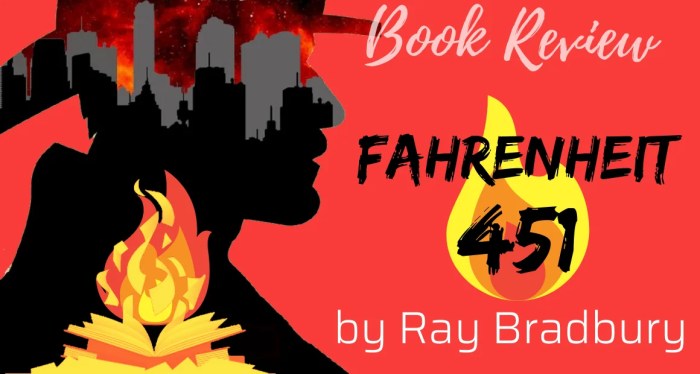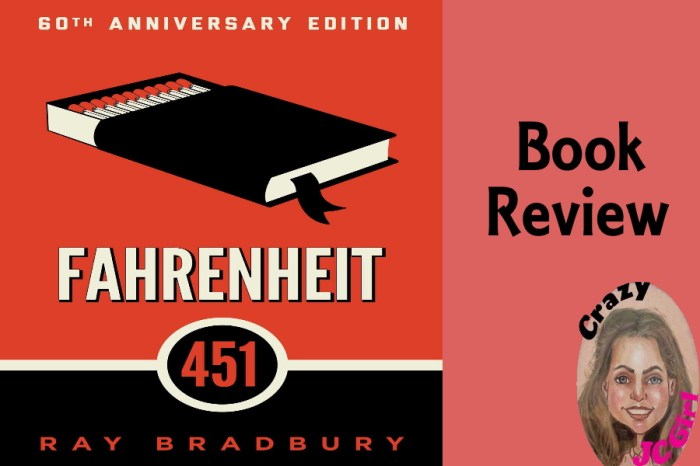Fahrenheit 451 book with match – In Ray Bradbury’s seminal novel, Fahrenheit 451, a book with a match becomes a potent symbol of hope and resistance in a society that has outlawed reading. Join us as we delve into the significance of this iconic object and its profound implications for knowledge, individuality, and the dangers of totalitarianism.
Fahrenheit 451 presents a chilling vision of a dystopian future where firemen are tasked with burning books, extinguishing the flames of critical thinking and intellectual freedom. Against this oppressive backdrop, the match emerges as a beacon of hope, a reminder of the indomitable spirit that resides within the human heart.
Historical Context of Fahrenheit 451
Ray Bradbury penned Fahrenheit 451 against the backdrop of significant historical events that shaped the novel’s dystopian themes.
The novel emerged during the height of McCarthyism, a period of intense anti-communist sentiment in the United States. The fear of communist infiltration and subversion fueled widespread paranoia and suppression of dissent. Bradbury’s portrayal of a society where books are banned and critical thinking is discouraged reflects the chilling effects of McCarthyism.
The Cold War
The Cold War between the United States and the Soviet Union also influenced Fahrenheit 451. The threat of nuclear war and the ideological divide between the two superpowers created a sense of anxiety and uncertainty. The novel’s depiction of a society obsessed with conformity and suppressing individuality resonates with the Cold War’s emphasis on loyalty and fear of the unknown.
Symbolism of the Match in Fahrenheit 451
In Ray Bradbury’s dystopian novel Fahrenheit 451, the match emerges as a potent symbol of hope, resistance, and the indomitable power of knowledge.
The Match as a Beacon of Hope, Fahrenheit 451 book with match
In a society where books are outlawed and knowledge is suppressed, the match represents the potential for illumination and enlightenment. It serves as a reminder that even in the darkest of times, the human spirit yearns for truth and understanding.
The Match as a Symbol of Resistance
Guy Montag, the protagonist of the novel, initially embraces his role as a “fireman” tasked with burning books. However, his encounter with Clarisse McClellan and the realization of the emptiness of his existence awaken a rebellious spirit within him. The match becomes a symbol of his defiance against the oppressive regime, a tool for igniting change and challenging the status quo.
The Match as the Power of Individuality
In a society that values conformity and obedience, the match represents the indomitable power of the individual. It symbolizes the ability to think critically, question authority, and forge one’s own path, even in the face of adversity.
The Burning of Books in Fahrenheit 451

In Ray Bradbury’s dystopian novel Fahrenheit 451, firemen are not tasked with extinguishing fires but with setting them, specifically to burn books. This paradoxical role symbolizes the suppression of knowledge and critical thinking in a society that values conformity and ignorance.
The Role of Firemen
Firemen in Fahrenheit 451 are not protectors but destroyers, enforcing the government’s ban on books. Their primary mission is to locate and incinerate any printed material, including novels, newspapers, and even personal journals. They are equipped with flamethrowers, known as “salamanders,” which they use to burn books with ruthless efficiency.
Impact of Book Burning
The burning of books has a devastating impact on society. Without access to literature, people lose the ability to think critically and question authority. They become passive and accepting of the government’s propaganda, which portrays books as dangerous and subversive.
The suppression of knowledge stifles creativity, imagination, and intellectual growth, creating a society that is intellectually and culturally barren.
Characters and their Relationships in Fahrenheit 451

Fahrenheit 451 features a cast of characters who embody the novel’s themes of censorship, rebellion, and the importance of knowledge.
The protagonist, Guy Montag, is a fireman whose job is to burn books. However, as the novel progresses, he begins to question his beliefs and ultimately rebels against the oppressive society he lives in.
Guy Montag and Mildred Montag
Guy Montag is the protagonist of Fahrenheit 451. He is a fireman who is initially content with his job of burning books. However, as he begins to read the books he burns, he begins to question his beliefs and the society he lives in.
Mildred Montag is Guy’s wife. She is a shallow and materialistic woman who is addicted to television and sleeping pills. She does not share Guy’s interest in books or his growing disillusionment with society.
Guy and Mildred’s relationship is strained. They are unable to communicate with each other and they have grown apart. Guy’s growing interest in books and Mildred’s shallowness drive a wedge between them.
In Fahrenheit 451, Montag’s book burning symbolized the destruction of knowledge and free thought. In contrast, the bju world studies 4th edition emphasizes the importance of education and critical thinking, promoting the preservation and dissemination of knowledge. Yet, like the phoenix that rose from the ashes, the resilience of the human spirit prevails in Fahrenheit 451, as Montag’s quest for knowledge ignites a spark of resistance against the oppressive regime.
Guy Montag and Captain Beatty
Captain Beatty is the captain of the fire station where Guy Montag works. He is a charismatic and intelligent man who is a strong believer in the government’s censorship policies.
Beatty is a mentor to Guy, but he also represents the oppressive society that Guy is beginning to rebel against. Beatty’s death at the hands of Montag is a turning point in the novel, as it symbolizes Guy’s окончательный break with the society he once knew.
Themes Explored in Fahrenheit 451

Fahrenheit 451 is a novel that explores various profound themes that remain relevant in contemporary society. These themes include censorship, the importance of knowledge, and the dangers of totalitarianism.
Censorship
One of the central themes in Fahrenheit 451 is censorship. In the novel, the government has banned books and any form of independent thought, leading to a society where people are deprived of knowledge and critical thinking. The burning of books symbolizes the suppression of ideas and the control over information by the authorities.
“It was a pleasure to burn.”- Montag
Importance of Knowledge
Fahrenheit 451 also emphasizes the importance of knowledge and the power it holds. The novel suggests that access to information and education is crucial for personal growth, intellectual development, and the preservation of human culture. The characters who possess knowledge, such as Faber and Clarisse, are depicted as rebels who challenge the oppressive regime.
Dangers of Totalitarianism
Fahrenheit 451 warns against the dangers of totalitarianism and the consequences of unchecked power. The novel portrays a society where the government has complete control over every aspect of people’s lives, including their thoughts and beliefs. This oppressive system leads to conformity, fear, and the suppression of individuality.
“We must all be alike. Not everyone born free and equal, as the constitution says, but everyone made equal. Each man the image of every other; then all are happy, for there are no mountains to make them cower, to make them wish for wings.”- Beatty
Fahrenheit 451 as a Dystopian Novel: Fahrenheit 451 Book With Match

Fahrenheit 451 by Ray Bradbury is a classic example of a dystopian novel, a genre that depicts a society that is undesirable or frightening. Dystopian novels often explore themes of oppression, control, and the loss of individuality.
Fahrenheit 451 is set in a future where books are banned and firefighters are tasked with burning them. The novel’s protagonist, Guy Montag, is a fireman who begins to question the society he lives in after meeting Clarisse McClellan, a young woman who loves to read.
As Montag learns more about the dangers of censorship and the importance of free thought, he begins to rebel against the government.
Characteristics of a Dystopian Novel
- A totalitarian government that controls every aspect of citizens’ lives.
- A society that is divided into rigidly defined classes.
- A lack of freedom of speech, press, and assembly.
- A pervasive sense of fear and paranoia.
- A reliance on technology to control the population.
Fahrenheit 451 as a Dystopian Novel
Fahrenheit 451 fits into the dystopian genre because it depicts a society that is controlled by fear and ignorance. The government in Fahrenheit 451 has banned books because they are seen as a threat to its authority. The people in this society are afraid to think for themselves and they are willing to give up their freedom in exchange for security.
Fahrenheit 451 is a powerful warning about the dangers of censorship and the importance of free thought. It is a novel that will stay with you long after you finish reading it.
Adaptations of Fahrenheit 451
The dystopian masterpiece “Fahrenheit 451” by Ray Bradbury has captured the imaginations of audiences worldwide, leading to numerous adaptations across various media.
One of the most notable adaptations is the 1966 film directed by François Truffaut. Truffaut’s film is widely regarded as a faithful adaptation, capturing the novel’s themes and atmosphere with remarkable accuracy. The film stars Oskar Werner as Montag and Julie Christie as Clarisse, and its haunting visuals and thought-provoking dialogue have cemented its status as a classic.
Another significant adaptation is the 2018 film directed by Ramin Bahrani. While Bahrani’s film takes some liberties with the original story, it retains the novel’s core themes and offers a contemporary interpretation of the dystopian society.
Stage productions of “Fahrenheit 451” have also been produced, including a 2017 adaptation by the Royal Shakespeare Company. These productions offer a unique and immersive experience, allowing audiences to witness the novel’s themes and characters brought to life on stage.
In addition to film and stage adaptations, “Fahrenheit 451” has also been adapted into various other formats, including radio dramas, graphic novels, and video games. Each adaptation offers its own unique interpretation of the novel, exploring different aspects of its themes and characters.
While each adaptation of “Fahrenheit 451” has its own strengths and weaknesses, they all share a common goal: to convey the novel’s timeless message about the importance of free thought, individuality, and the dangers of censorship.
Detailed FAQs
What is the significance of the match in Fahrenheit 451?
The match represents hope, resistance, and the power of knowledge in a society that suppresses critical thinking.
Who are the main characters in Fahrenheit 451?
Guy Montag, Mildred Montag, and Captain Beatty are the central characters in the novel.
What are the themes explored in Fahrenheit 451?
Censorship, the importance of knowledge, and the dangers of totalitarianism are key themes in the novel.